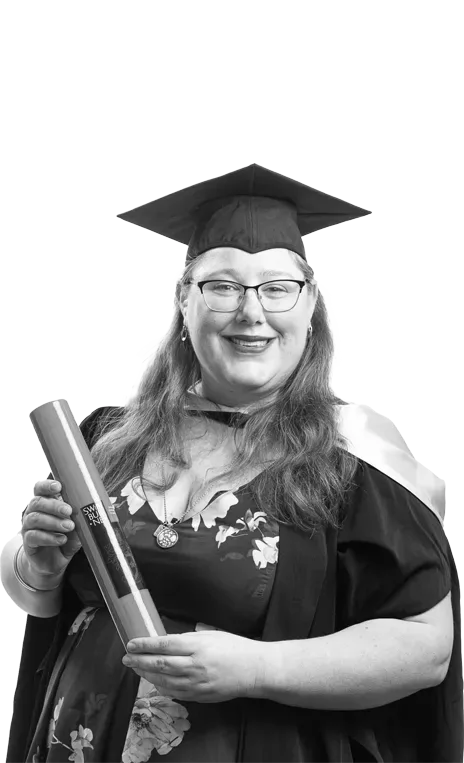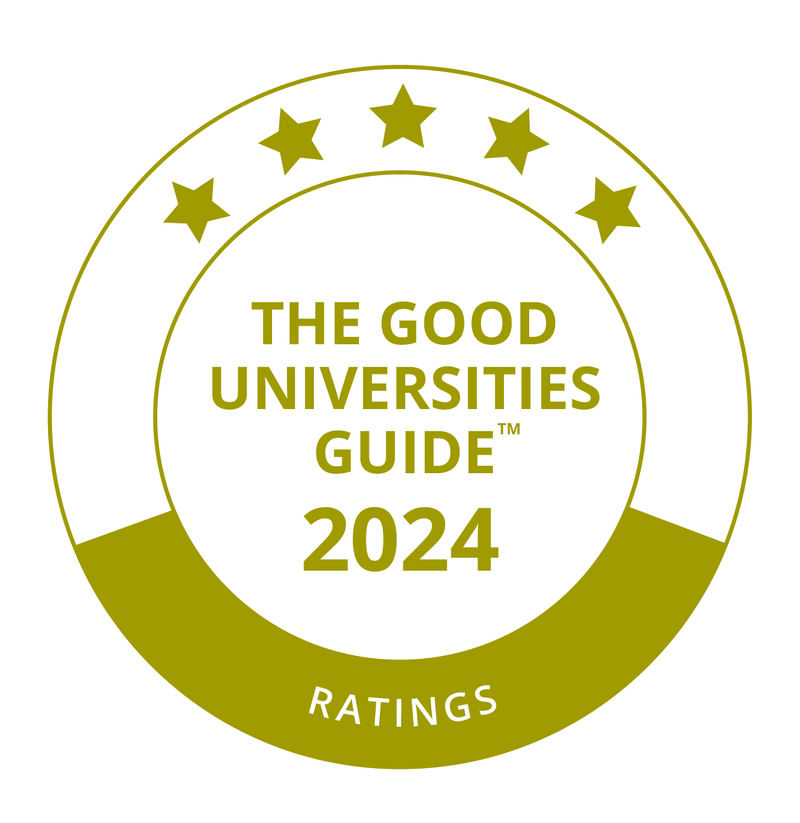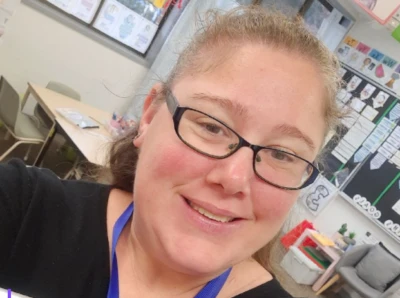100% Online
Bachelor of Education (Primary)
Shape the minds of the future and become a primary teacher by studying a Bachelor of Education (Primary).
Undergraduate
Qualification
4 years full-time
Duration
Mar, Jul, Nov
Start Date
32
Units
100% Online
Learning Mode
$4,445*
Fees

‘The benefit of studying online with Swinburne Online has allowed me to schedule my time efficiently and effectively around [my life]. I have been provided with a world-class education led by industry leaders and professionals.’
Kate, Swinburne Online Education graduate
6.5% ▴
As a Primary School Teacher, you’ll have a strong future ahead of you, with a 6.5% increase expected in the next five years.

Our undergraduate education courses have been awarded a five-star rating for overall experience, learning resources, skills development, teaching quality and student support.
With a Swinburne Bachelor of Education (Primary) you will be qualified to teach in primary schools across Australia.
Led by experienced education professionals with recent or current classroom teaching practice, this course combines online learning with teaching placements in real school classrooms. Our students get great feedback from their placement schools – we ensure you are prepared and supported by our course tutors and advisors to make your placement a positive experience.
You’ll enter the classroom confident and ready to inspire your students after taking part in teaching simulations that allow you to experience what it’s like to teach a class using the latest VR technology.
As a Swinburne Online student, you will also have access to unique development opportunities. These include the Swinburne Teachers and Regional Remote Schools (STARS) program, which is part of the Access Quality Teaching Initiative. The program will place you in professional experience placements in regional, remote and/or lower socio-educational advantage schools in Victoria, giving you valuable experience with a diverse range of educational communities.
When you graduate, you’ll be qualified to practice as a primary teacher, with accreditation from the Victorian Institute of Teaching (VIT).
This course is not available to international students.
What will you learn?
- Language & Literacy: Understand how literacy and multi-literacy develops in young children.
- Health & Physical Education: Learn how to plan, teach and assess health and physical education in primary environments.
- Curriculum Planning: Create learning activities to engage students and develop their skills.
- Twenty-First Century Teaching: Embrace the role of being a teacher in an era of rapid change.
Learn more about our professional accreditations. Download a Course Guide.
Flexible study
Flexible study
What does flexible study mean for me?
Studying at Swinburne Online gives you the freedom to study how it suits you. Decide when and where it fits in with your life and tailor your study journey to your own needs. Get a world-class degree without giving up what’s important.
Flexible study at Swinburne Online
Personalised study journey
Set a study pace that work with what’s going on in your life. If you’re unsure about how much you can commit to, we can offer part-time options and the option of increasing your unit load as your progress. Interested in fast-tracking your studies? You also have the opportunity to complete up to 12 units per year.
Fit study around your life
You don’t have to put your life on hold to study. Prioritise what matters to you and fit study around family, work and personal commitments through a course that is flexibly designed for online learners.
Multiple intakes
Start when it suits. Swinburne Online offers multiple intake dates and flexible unit availability, so you can choose when you begin your studies or if you need to take a break.
7-day support
Flexible study requires flexible support. As a Swinburne Online student, you’ll have support for extended hours, seven days a week, with Student Advisors available to help with any queries. You will also have dedicated online tutors in each of your units.
Structure
Structure
Your course structure
The Bachelor of Education (Primary) consists of 32 units, including 10 core units, 18 major units and four practicum units.
Your units are led by experienced education professionals with recent or current teaching experience and focus on arming you with the practical skills you can take straight into the classroom. You will also undertake practicum units that will give you the opportunity to work and learn in an Australian school.
Primary specialisation
All pre-service teachers in a primary or early childhood primary initial teacher education courses must complete a primary specialisation component. It is an AlTSL requirement for all Primary ITE course accreditation.
This will result in Graduates who are generalist Primary Teachers with a specialisation. This is distinct from teachers who fulfil specialist roles in schools such as a health/physical education teacher.
These requirements will become more explicit once you are enrolled in the relevant unit.
Course Learning Outcomes (CLO)
On successful completion of this Course students will be able to:
- CLO1: Show advanced knowledge, skills and capabilities relevant to their specialisation and discipline(s)
- CLO2: Use their broad and coherent knowledge of Primary School content areas within the relevant curriculum context to critically review theory and practice
- CLO3: Show initiative and judgement to plan for, and implement, effective teaching and learning in diverse contexts with the capacity to impact student learning
- CLO4: Adapt research-led knowledge and skills to critically analyse and evaluate information from a variety of sources to make informed judgements, and share skills and ideas with others with intellectual independence
- CLO5: Assess, provide feedback and report on student learning using clear and coherent communication with the ability to critically analyse, consolidate and synthesise assessment information
- CLO6: Take responsibility and accountability for own learning to identify, engage in and apply professional learning, individually and in collaboration with others
- CLO7: Show highly effective communication skills, including engage professionally with colleagues, families and children to present clear, creative and independent decision making
- CLO8: Create and maintain supportive, safe and inclusive learning environments including the creative integration of digital technologies to enhance student learning
- CLO9: Develop teaching and learning strategies and understandings that encompass differentiated and inclusive approaches appropriate for diverse learners in varied contexts, including Aboriginal and Torres Strait Islander peoples, and their histories, languages and cultures
View your course structure
Studying education with Swinburne Online is a unique opportunity. Our courses are at the forefront of industry and provide you with the practical skills to success come graduation. View all units in your bachelor’s degree.
View All UnitsHow you'll learn
How you'll learn
Learning designed for online
Your study journey with Swinburne Online is tailored to the digital space. You’ll study in a dynamic virtual classroom environment and interact with your peers in the custom-built social platform. You will also receive support at the times you need it from advisors who understand studying online.
Online classroom
You’ll complete each of your units in Canvas, your online classroom, and guided through coursework by an online tutor with real-world experience in your field of study. Canvas is where you’ll access classes, assignments and discussion boards with your peers.
Online campus
The Student Hub is your online campus, where you’ll access the support and resources to assist you throughout your study journey. From managing your course to technical support and library resources, you’ll find it all in one easy location.
Tailored support
Swinburne Online will be there for you each step of the way. From enrolment through to graduation, we offer extended, flexible support in each of your units and advisors to assist with any queries.
Entry requirements
Entry requirements
Discover the entry requirements for the Bachelor of Education (Primary).
Non-Year 12 entry
- Completion of a VE Diploma in a related field from a public or dual sector TAFE, or Swinburne approved Registered Training Organisation (RTO)*.
- Completion or partial completion of an approved tertiary qualification (including advanced diplomas, associate degrees and degrees). Additional performance criteria and prerequisite requirements may also apply.
- Students admitted to the course with prior tertiary studies that satisfy part of the academic requirements of this course may be eligible for academic credit of up to 16 units.
* Visit this website to determine if your RTO is public or dual sector. A public RTO will be listed as ‘Technical and Further Education Institute, Skills Institute, or Polytechnic.’ Dual sector RTO’s are listed as ‘University – Government’.
Read our Applying and Enrolling FAQs.
Entry via non-teaching degree.
Year 12 entry
Successful completion of the Victorian Certificate of Education (VCE) or its equivalent, such as an interstate or international Year 12 qualification. Minimum ATAR requirements may apply.
Additional requirements
CASPer
All applicants (both standard entry and non-year 12 entry) must successfully complete the CASPer assessment. CASPer is a non-academic suitability assessment tool designed to assess an applicant’s personal and professional attributes.
It is an Australian Government accreditation requirement that all initial teacher education courses include non-academic selection criteria.
To ensure you don’t miss the CASPer deadlines and to register for your sitting or for further information about the test, visit takecasper.com.
For current Year 12 students, to ensure you meet VTAC deadlines go to www.vtac.edu.au/admissions-tests.html.
Admission to this course will consider both academic and non-academic results.
If you’re looking to apply for our Bachelor of Education (Primary) course you will need to complete the CASPer suitability tool. Get in touch with a Course Consultant to find out more information.
English language proficiency
All applicants must demonstrate suitable English language proficiency for successful completion of the course.
The university may determine selection criteria and restrictions in respect of courses to apply in addition to these entry requirements.
Eligibility for admission does not guarantee offer of a place.
Working with Children Check and Police Check
All enrolled students must maintain a current Working with Children Check (from the appropriate State Authority). A Police Check may also be required by a school prior to a placement. For a list of each state’s requirements see the Care for Kids website.
Literacy and numeracy test for initial teacher education
To be eligible to graduate, students must pass the Literacy and Numeracy Test for Initial Teacher Education (LANTITE), which is required to become a registered teacher. This test is run externally at the applicant’s expense. Applicants must disclose all previous LANTITE attempts (if any) through a personal statement and upload the results for each attempt. Applicants who have unsuccessfully attempted LANTITE three or more times will not be eligible to receive an offer for this course.
Once enrolled, all applicants must provide relevant Child Safety Screening clearance as your state of residence requires and maintain clearances throughout the duration of the program.
Courses are only available to Australian and New Zealand citizens, permanent residents and humanitarian visa holders.
Fees
Fees
The estimated annual fee for this course is $4,445*. This is based on completing eight 12.5 credit point units in one calendar year.
Commonwealth provided loans are available to assist eligible students to pay their course fees and there are a range of university, government and privately funded scholarships and prizes.
Discover more information about HELP loans.
Course fees will be affected by a student’s unit selection and any credit awarded in recognition of previous academic experience.
This course is not available to international students.
Domestic students also contribute to student services and amenities via an annual fee.
Scholarships
Scholarships are available for both commencing and current students. You may be eligible for Swinburne Scholarships.
Career Outcomes
Career Outcomes
Become a teacher of the future
Our education graduates work in a range of rewarding roles and industries. The Bachelor of Education (Primary) prioritises practical theory and experience inside a real classroom so that you can graduate with your foot already in the door. You will:
- Undertake practicum units that place you inside an Australian classroom
- Learn where the future of education is heading and how you can keep pace
- Learn from real educational professionals.
Primary School Teacher
Educate students aged 5–12 years through classroom lessons and educational programs covering a variety of subjects.
Primary School Principal
Lead the educational direction of a primary school and ensure the curriculum is taught to national standards.

Accreditations

When you graduate, you’ll be qualified to practice as a primary teacher, with accreditation from the Victorian Institute of Teaching (VIT).
Testimonial
‘I have gained profound educational knowledge and teaching skills as a direct result of my time at Swinburne Online to prepare me for my teaching career. I also volunteered with the Swinburne Mentor Program, which helped me to develop confidence and capability to support beginner teachers studying with Swinburne Online.’
Kate
Swinburne Online graduate

More Courses
Other courses you may be interested in
Bachelor of Education (Early Childhood Teaching)
Bachelor of Education (Early Childhood and Primary)